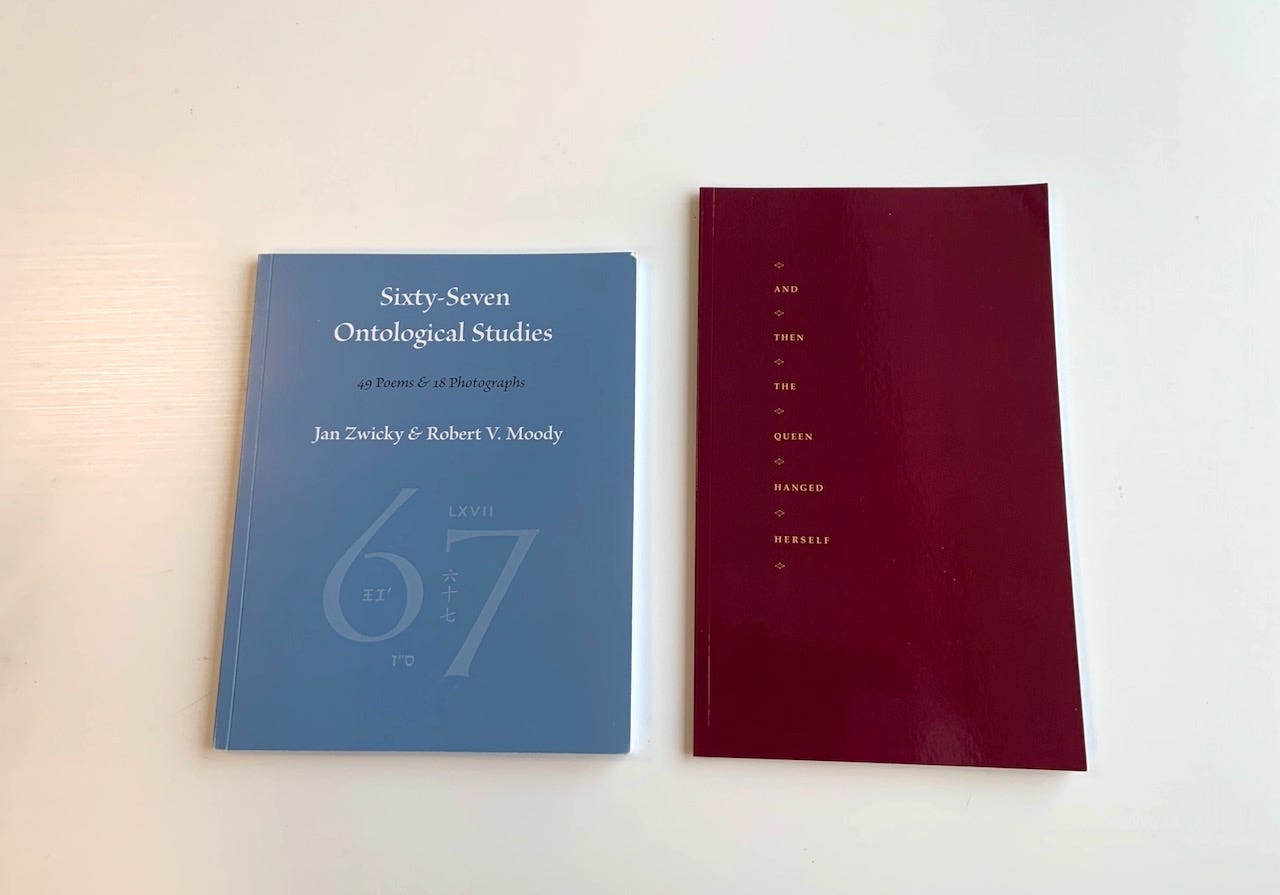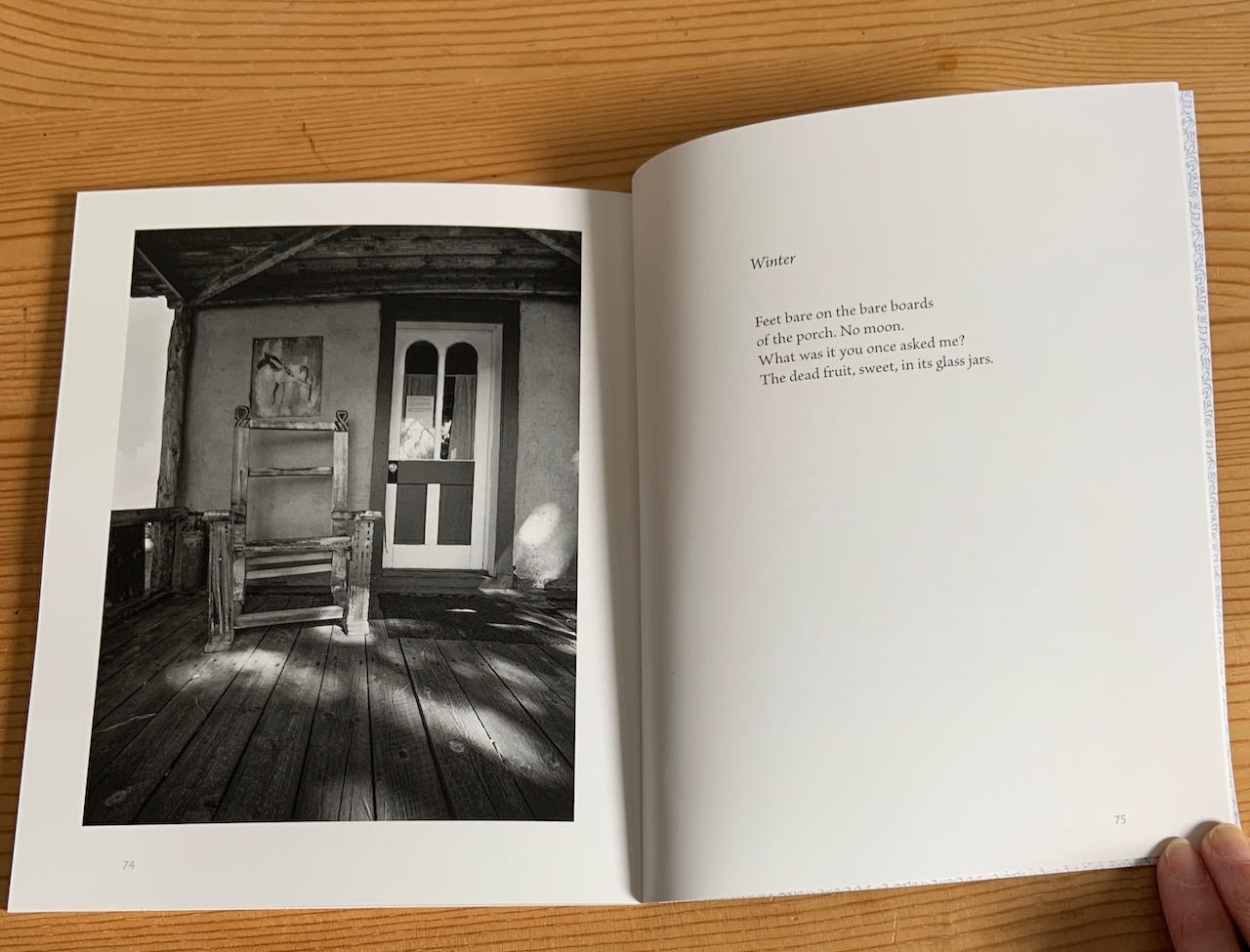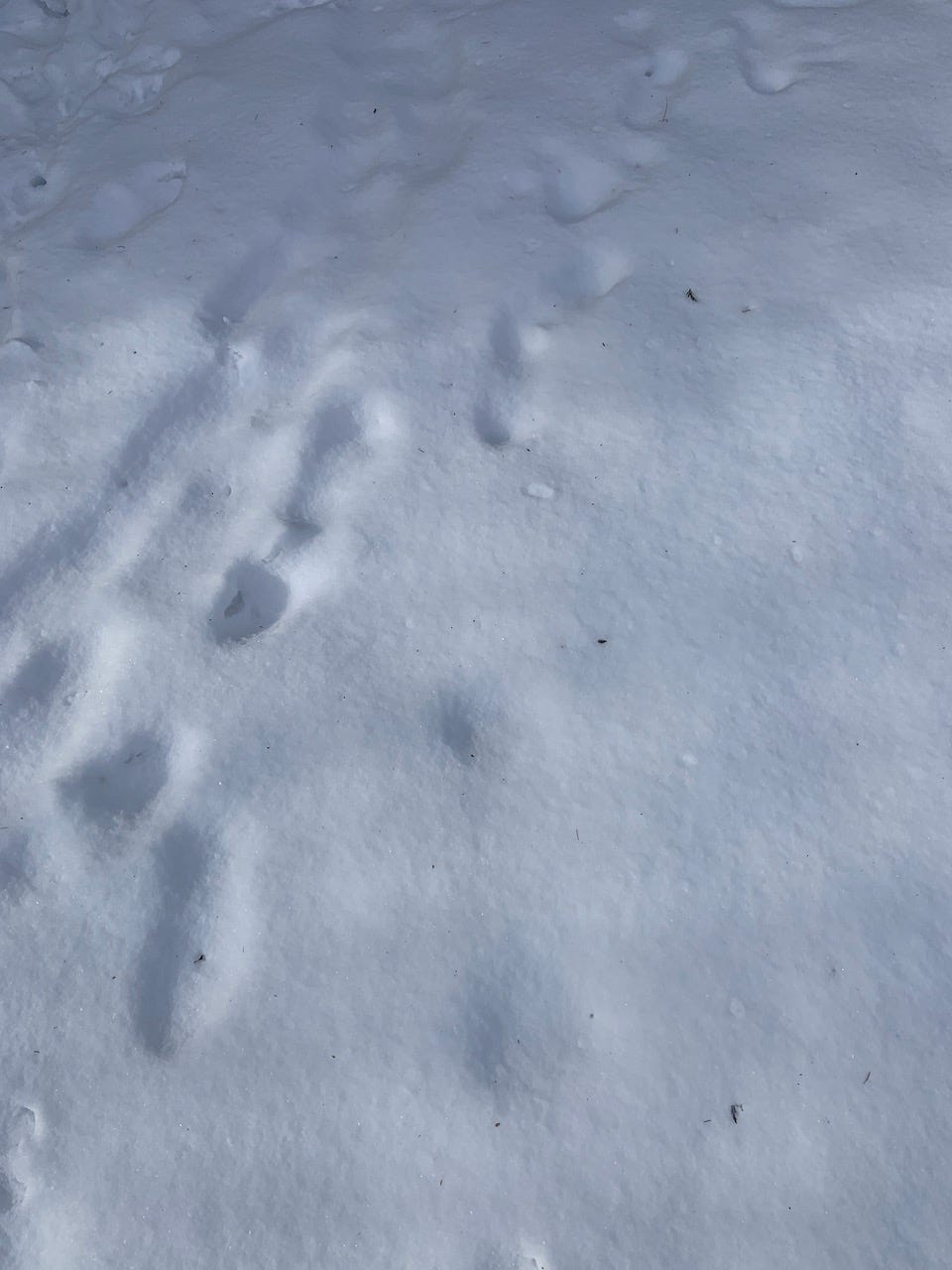The Truth
Two books by Jan Zwicky, and a brief interview
Beached Seal, Dying
It could be
I shouldn’t wait with you.
When I’m dying
I might want to be alone, without
distraction, work to do
unhooking and unbraiding,
loosening the seams. I’ll be glad
if it’s like this, though,
under open sky, near dusk,
the bow wave of the distant ferry
motionless, a gull
tipped sideways for a second
in the wind.
— from Sixty-Seven Ontological Studies1
Carved out, hollow, stand of reeds, air through the chambers, a soft breeze passing through. Then a gust, sudden, shattering, instrument giving full voice to air, and the voice says a thing that frightens, chimes entangle, alarm.
To place Jan Zwicky’s newest book, a collaboration with photographer Robert V. Moody called Sixty-Seven Ontological Studies, alongside her newest chapbook, And Then the Queen Hanged Herself, is a study in range—tonal, formal, emotional—that I almost can’t write about here, the former so still, the latter so inflamed. Last week the temperature fell thirty degrees in half that number of hours, then it rocketed back up again. Yesterday forty millimetres of rain fell with nowhere to absorb. I best find a home in writing such extremes.
The mind tries to find connection, relation, to search for what’s shared. Through both these books, what I think about is air.
I recall Zwicky saying something, maybe it was at Sage Hill, about the human voice as wind instrument, as reed instrument—I’m definitely not getting her exact words right but I bet I’ve got them in an old notebook somewhere. (Oh the urge to go digging for those words. This is the season. Without a doubt I’d never return.)
Air pushed out the lungs to vibrate the vocal cords, to put words to the thing. The process of this, how that air is measured and moved. To say what needs saying here, to lean you toward the way Zwicky uses voice, breath, the music of language, the rigour of thought, few others so precise, requires me to tell you how I read the book and the chapbook. With each poem, I took two runs. Read, breathe, reread. Move the air again. Study.
Old Blues
I wish I knew why we don’t get along.
The visions that you’ve sprung in me —
Jiménez, Szymborska, Pindar, Plath ... I could name
a hundred more. Not music, no, but
still I’ve had to change my life.
The hubbub and the laughter there
behind the golden windows of your house.
And yet I’m out here, cold, boot-stupid,
in the dark and rain. Language,
why don’t I love you more?2
The poems in Sixty-Seven Ontological Studies are spare, engaged in the hardest thing: to get closer to what is.
“Ontology is exactly what lyric insight realizes is beyond language,” we hear her say in Mark Dickinson’s book Canadian Primal,3 on the lives and works of Zwicky, Robert Bringhurst, Tim Lilburn, Don McKay, and Dennis Lee. (A stellar book.)
And here she is in Sixty-Seven Ontological Studies, reaching beyond language, that difficult stretch. Focus. Quiet. Finding the true words for the beloved armchair, the season, the skin.
Laurie G.: First, Jan, I want to ask you about the kind of attention at work in Sixty-Seven Ontological Studies. These poems are (to this reader) meditative, slow, spare, composed, and I’m curious to know if the manner of attention at work led directly to the form and tone the poems use, or was the route more circuitous? Did Robert Moody’s photographs help you find the form/tone of the poems, or was this a case of a serendipitous dovetailing of your two distinct but similar projects?
Jan Z.: Let me take the second part of this question first, because it’s easier. Robert Moody and I had independently generated nearly all the photographs and poems before we started on the collaborative project; and the few that came later were also generated on their own, without particular thought for the collection. They were made for themselves, but seemed to fit.
As for the relation between the manner of attention and the tone of the poems, I can’t be as clear. I’ve been writing ontological studies for at least a couple of decades, during which time I also worked in other forms. Did I know when I started a piece that it was going to be an ontological study? Yes. At least, once I’d written a few. I also work in a form I call ‘small song’ — it’s similarly compact, about the same number of lines — and when the first studies started appearing, I’d sometimes think I was working on a small song. But the tone of the songs is sweeter; there’s a lilt I wasn’t detecting in the studies. And soon, more or less as the first images or words came, I could tell the difference.
Laurie G.: I especially admire the brevity of these poems. Do you find brevity hard to achieve? If yes, why, oh why is it so hard? If no, how, oh how do you do it?
Jan Z.: How achieve brevity? Write only what’s necessary. — It’d be clever, wouldn’t it, to stop there. But I think you may be asking how one knows what’s necessary. On that score, I’m not so clever. When a poem starts to shape itself somewhere in the vicinity of my receiving apparatus, I’ll usually get a phrase or two, and often something like a kinaesthetic ghost of the poem as a whole. No words. Nothing definite of any sort. As though there’s something vague, smudged, blurry — a cloud — at the edge of my peripheral hearing. But I can usually tell something about the size of the cloud, despite its vagueness, and something about its tonality or key.
Aeneid, Book IV: Anna
You don’t understand. I did
adore her and her death was mine. But it wasn’t
trading sweaters and painting one another’s fingernails.
It was Carthage. We — we —
made it happen. We’d closed the door,
the two of us, dug up the gold
and hauled it to the beach.
The strips of hide were my idea, but it was
her strength that kept the army loyal. You see:
our souls are fire, just like the souls of men.
I do not want to understand, but it’s no use,
I do. Hers ate her from the inside out. And I,
I couldn’t stand her pain. At every turn,
I was its tool. But if, instead,
a voice from up there in the clouds
had said that it was she, not he, who had to live
to stake some lineage — we’d
have laughed. Heroes
never kill themselves for love.
Smoke rose to heaven. How it stank.
Aeneas out there on the cool blue sea.
— from And Then the Queen Hanged Herself4
Now the wind picks up.
A withering. Withstanding it. Doom. Failure. Pain. The chapbook starts with a hard admission, a hard poem, called “What Do Women Want?”
When I realized that I’d been infected,
that I’d come to harbour not just one
but two desires, that I wanted
what men want, an echo of my thinking
in the halls men build, as well as wanting it
to steer me true, then I was sorrow-struck,
a blunt bit fouled my tongue
and I fell silent, every opening inside me
closed to joy.
Despair drives the poem’s speaker into the water.
In that place, there,
what I knew: fire is no metaphor, water
no metaphor: they were
my rage, my grief, and I
was lightless earth.5
The poem that results, the chapbook that results, sits in the hardest place. A compendium of instances in ancient Greek and Roman texts of women dying by their own hand. In the repetition you come to see the injustice of these depictions, the trope that forms, the misogyny and violence, the apparent ease of their erasure. As the final poem states, with mocking casualness,
she cries and sobs and cries and sobs, and then
since there’s this tree, she goes and hangs herself.6
And the effect of the chapbook’s long title poem, a list poem, in essence: woman after woman, the horror or grief that brings the act about, and in some cases the complete inanity. The why of it blares, rattles the windows. A chapbook of a mere twenty-two pages, and the weight crushes and is necessary. The thing being said looms, hulks deftly, wordlessly within the text. And yet the music of certain lines:
A bad wind whistles through her then,
the one who’s left without a heart7
She masters fate
by choosing reputation over life. Hangs.
Frees herself of terrifying love.8
Laurie G.: The poems in And Then the Queen Hanged Herself could be thought of as opposites to those in Sixty-Seven Ontological Studies: longer, emotionally difficult, excoriating, politically electrified, responding to myth. Their subject matter, in fact, is crushing. Do you find any sense of relief after writing the hard poem? Do you set lofty goals for the excoriating poem?
Jan Z.: The poems in And Then the Queen Hanged Herself were indeed hard to write. I had to keep my head down, a few inches from the page, as it were, and not look to the side or look up. No emotion recollected in tranquility, let me tell you; more like trying not to feel, trying to channel a kind of raw energy into words before it became feeling. Was there relief when I finished writing? I felt a kind of clarity. There. The truth. Things fell, briefly, still. Like after the almost-accident when the car has stopped skidding, and you sit there, undamaged but a bit stunned.
I’m afraid I’m not conscious enough as a poet to set goals. I pretty much have to take what comes. After it’s on the page, I ask myself if it’s worth showing to readers. And there, the question of whether the poem is adequate to its subject matter can arise. With politics, it can be especially difficult to decide; I have to leave the thing in a drawer for quite a while, and I often seek perspective from an editor-friend.
And Then the Queen Hanged Herself and Sixty-Seven Ontological Studies tackle the hardest things using difficult tools. They turn our minds to failure, that vital examination. To impermanence. To what returns. To what’s loved. To the fact of feeling. And to its absence. They reach beyond lyric to see and say what’s there. They extend toward and find the language for truth. This is what poetry can do. This is what Jan Zwicky’s poetry does. I am so very thankful for it.
Sixty-Seven Ontological Studies: 49 Poems & 18 Photographs, Jan Zwicky & Robert V. Moody (Freehand, 2022), p. 16.
Sixty-Seven Ontological Studies, p. 40.
Canadian Primal: Poets, Places, and the Music of Meaning, Mark Dickinson (McGill-Queen’s University Press, 2021), p. 160.
And Then the Queen Hanged Herself, Jan Zwicky (Deer Mountain Pages, 2022), p. 5.
And Then the Queen Hanged Herself, p. 1.
And Then the Queen Hanged Herself, p. 21.
And Then…, p. 3.
And Then…, p. 20.




